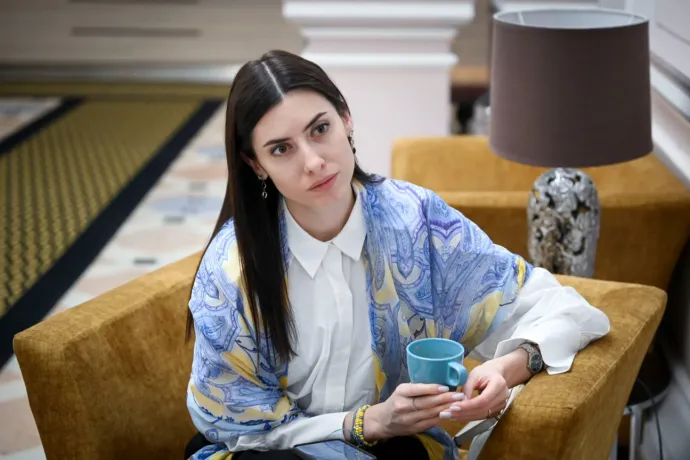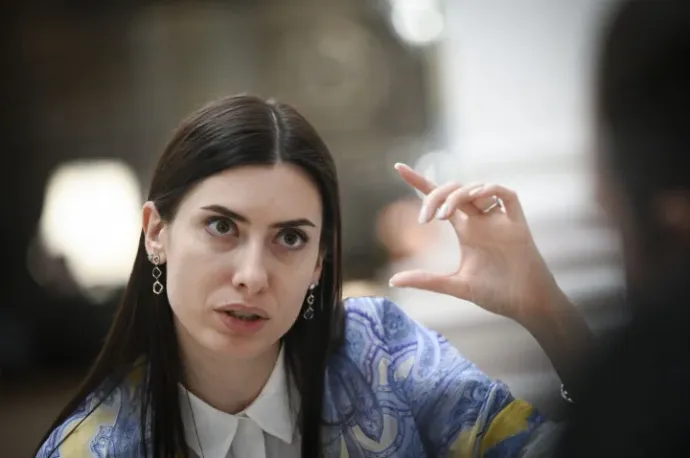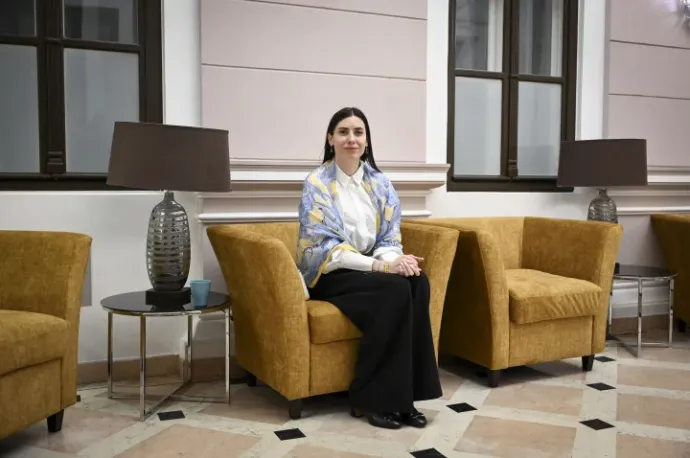Ukrainian politician about Hungary's maverick politics: there must be some Russian blackmail behind it

Ukraine expects more intensive support from Hungary while it's defending all of Europe by holding back the Russian invasion. A Ukrainian politician said that Budapest's effort to pursue its own, separate policy on Russia, as a member of the EU and NATO is not sustainable and at times indicates effective Russian blackmail in the background. An agreement needs to be reached between Budapest and Kyiv on the education law regulating both minorities and language use – although the parties seem to continue to talk at cross purposes. We spoke to the head of the Ukrainian delegation to the Council of Europe, Maria Mezentseva, who came to Budapest at the invitation of the Budapest-based Policy Research and Consulting Institute, Political Capital.
"I was sitting in the basement when they patched me in to the meeting of the foreign ministers of the 47 member states of the Council of Europe to discuss our initiative about excluding Russia from all levels of the organization," Maria Mezentseva recalled the first days of Moscow's attack on Ukraine 13 months ago.
Two days later, the head of the Ukrainian delegation to the Parliamentary Assembly of the Council of Europe (PACE), leading an all-women delegation due to the war, had arrived in Strasbourg, where the Council of Europe decided to exclude Russia completely.
It was the first time that a country had been excluded from the entire structure of the Council of Europe – until then, Russia had only been excluded from PACE itself, since the annexation of Crimea in 2014.
Maria Mezentseva was born in 1989 in Kharkiv. She comes from a mixed family with a Russian-Ukrainian linguistic background. She graduated in specialized English translation and international relations in Kharkiv and also studied at the University of Kent. She interned in the European Parliament and at the UN, and later in Brussels at the EU-Ukraine Business Forums. In 2019 she became a Member of Parliament as a member of the Servant of the People, the party behind President Volodymyr Zelensky.
She is deputy head of the parliamentary commission for Ukraine's Euro-Atlantic integration and leads the country's delegation to the Council of Europe.
In her spare time she is involved in modern dance and has won several Ukrainian championships.
Hungary also backed Russia’s expulsion
"The initiative was supported by Hungary, for which we are very grateful", she said, highlighting an episode that illustrates the contradictory practice of the Hungarian leadership, which tends to walk its own path compared to EU members when it comes to resolutions.
This was followed by five other decisions that Hungary also supported. But the first was clear: the exclusion was justified by the decision on the grounds that Russia had been committing aggression against Ukraine since 2014. “It was important for us to make it clear that the war did not start last year, but in 2014.”
One of the resolutions, supported by Hungary, proposed the creation of an extraordinary criminal court specifically focused on crimes relating to the aggression. There are legal reasons for this:
The arrest warrant issued against the Russian president by the International Criminal Court (ICC) in The Hague (which we wrote about in detail here), now covers crimes against humanity, not aggression – as neither Ukraine nor Russia have signed the Rome Statute establishing the acceptance of the court's legal jurisdiction.
Ukraine nevertheless accepts the jurisdiction of the ICC in investigating war crimes committed on its territory, but concerning the aggression, this is not possible unless both parties sign the Rome Statute.
This is why Ukraine has targeted the establishment of a special court where responsibility for crimes of aggression would be determined at the highest level, namely Vladimir Putin and his inner circle of around 20 people. “We have a record of 72,000 crimes, but that's just a fraction, it doesn't even include the hit on my home in Kharkiv, and there are plenty more like it.”
The ICC says it's a crime, the Kremlin is calling it help
Due to the above mentioned legal grounds, the ICC arrest warrant was issued for the suspected abduction of civilians, mainly children, directly blaming the Russian President and his appointed Children's Rights Ombudsman for having transferred at least 16 700 children to Russian territory. "This number could be much higher, but it certainly isn't 700,000 as Russia claims," Mezentseva says. At first glance, it is surprising that Russia is the one claiming a higher figure, but the reason for this is that Moscow claims the deportations are a humanitarian operation and is therefore interested in talking about as many children as possible," the representative explained. So far, 326 children have been brought back from these so-called summer camps.
Telex has also encountered this practice in one of the cities liberated from Russian occupation: a couple near Kharkiv had sent their children to a summer camp, but the city was taken over by Ukrainian forces and the Russian side had failed to return the children.
But the Russians also took policemen and doctors from occupied Kupyansk, Mezentseva pointed out. According to her, who the Russians deported or tortured in captivity and who was released is completely arbitrary.
The deportations show how difficult it is to bring civilians and captured soldiers back from the occupied territories. One of the points in the negotiations on the Minsk agreement was the mutual release of all prisoners – civilians and soldiers alike. Although this is far from complete, it is ongoing, with hundreds of cases being settled every week, according to Mezentseva.
She sees the violations on the Russian side as systemic. The Ukrainian politician said this was also demonstrated by the fate of the soldier who was shot on the spot after praising Ukraine, according to a video. "He was already a prisoner of war under the Geneva Convention. His execution in front of the cameras is proof that the convention is not being enforced and many similar cases have likely occurred," Mezentseva said.
Since you're here, we invite you to be a part of shaping Telex English! Take a few minutes to fill out our anonymous survey, and tell us what you think about Telex English and how it could be even better!
Moscow is running out of steam
"I have visited Russian POWs, and I was pleased to see that we Ukrainians are complying with the Geneva Convention, providing POWs with medical care, four meals a day, internet and the possibility of correspondence." "Some of them received their first dental treatment while there" – unfortunately, Ukrainians in Russian captivity cannot expect anything similar, Mezentseva said, noting that there are Ukrainians who were captured by Russia well before the war started a year ago, some more than five years ago.
She said that there's no reason to expect a constructive approach from Russia, as the Kremlin had never even guaranteed the safety of the evacuation convoys.

This is even less likely after Vladimir Putin's announcement that he would deploy tactical nuclear weapons to Belarus near the Ukrainian border. "As sad as this is, it is equally ridiculous. It is the last tool he has left to try to influence the processes he has completely lost control of since the beginning of his failed blitzkrieg. All that is left is improvisation," Mezentseva said of the Kremlin's policy. That is precisely why Western support is of particular importance, in which the Hungarian government is walking a path of its own.
The Hungarian government is a factor of uncertainty in Kyiv
"We weren't sure until the last minute that we would receive the €18 billion in aid." because of Hungary's intention to block the move, Mezentseva said, also citing as an example the fact that while Hungary is part of the ICC, it did not support the EU issuing a joint statement welcoming the ICC arrest warrant (the Hungarian Foreign Ministry denies vetoing it, saying it merely did not wish to comment on it, but did not oppose any member state or the High Representative doing so – which did happen, the statement being countersigned by the EU's High Representative for Foreign Affairs Josep Borell.)
This is odd, if only because Hungary was one of 38 countries that initiated ICC proceedings for investigating war crimes in Ukraine, which resulted in the arrest warrant for Vladimir Putin. Now, the Hungarian government says it cannot be executed, although the opinion of the government and international lawyers differs on this.
"Perhaps Hungary did not expect that a decision would be taken so quickly," Mezentseva said, adding that Putin is for sure very concerned about this development.
Despite the dismissive rhetoric, the Hungarian government is not so much of a hindrance in practice. It has voted in favour of the EU sanctions packages, and has also supported six PACE resolutions, as well as two resolutions of NATO's Parliamentary Assembly and one OSCE Parliamentary Assembly resolution.
Among the PACE resolutions supported by Hungary, one declares Russia a terrorist state, another supports the purchase of anti-aircraft missiles for Ukraine. "These are quite extravagant resolutions from an organization that fundamentally deals with human rights," Mezentseva admitted.
A resolution by PACE on the protection of children is planned for April. "I am sure that Hungary will support it". Mezentseva considers this likely because Viktor Orbán talks a lot about the protection of children in the context of LGBT issues, and this is no different from child protection, as
the rights of children trafficked to Russia "are violated on a daily basis when they are lied to, for example about their parents being dead, and are told that they need Russian citizenship for protection". According to Mezentseva, a scenario where these young people are later grouped together in a kind of militant youth organization and turned against Ukraine is quite possible.
Hungarians in Transcarpathia and Ukrainian refugees in Hungary
Mezentseva acknowledged that the education law adopted in 2017 is at the heart of the dispute between Kyiv and Budapest. The law was passed before Volodymyr Zelensky was elected president and the current administration merely inherited it.
There is also the controversial Law on Minorities, which was passed in December. “We are waiting for the Venice Commission's position on this, and PACE is also preparing a report. The person responsible for this is a Serb citizen of Hungarian nationality, Elvira Kovac, whom we have invited to visit Transcarpathia.”
Mezentseva said that Ukraine was ready to resume the work of the Hungarian-Ukrainian Intergovernmental Commission on Minorities, which had been halted by the war. "There is a need for dialogue" – which Kyiv would like to expand with another element.
“There are 33,000 registered Ukrainian refugees in Hungary, mostly women and children, who are studying online but trying to learn Hungarian so that they can become full members of society while they are there. Thus, we expect action. We are preparing for victory (against Russia) this year. But we have to know that if it drags on, they would be given the same opportunities – they are a minority of 33,000, which is not so small.”
In response to pointing out that there's a big difference between refugees crossing the border and the thousand-year-old Hungarian community in Transcarpathia, which has been abroad not because of their movement but because of the changing borders, she said there is no doubt about that, but added that Ukrainians have also been living in Hungary for centuries, "they could also say that they would like to speak Ukrainian in local governments, if, for example, the Hungarian side asks us to guarantee this in Ukraine," she said.
To the objection that the Ukrainian nationality speaker can speak in Ukrainian in the Hungarian Parliament – as Liliána Grexa did in her first few sentences – Mezentseva said: yes, that's clear, but it is important to explain the complex situation of the Ukrainian language. “For most of our history we have struggled to keep this language alive at all. Russia's goal now is to wipe us out, as a people, as a culture, as a language.”
"Language and culture are a weapon for us in a good sense," she said, referring to the fact that since 2015, even in areas previously considered more Russian-speaking, more and more people have been speaking Ukrainian, discovering their own Ukrainian identity.
"We don't want to diminish the rights of national minorities, but we do expect measures in response." As to what specific Hungarian action Kyiv would expect,
Mezentseva said that the first step was to restart the work of the intergovernmental committees.
"We are ready for dialogue and constructive work," she said, adding that Hungary's blocking of the NATO-Ukraine Commission on the basis of the 2017 language law "has traces of Russia in it." Following his meeting with Jens Stoltenberg last Tuesday, Foreign Minister Péter Szijjártó said that the NATO Secretary General had informed him that he would convene a ministerial-level meeting of the NATO-Ukraine Commission during the April 4 Foreign Ministers' Council, despite Hungary's opposition to the same.
Mezentseva said that they would like to renew ministerial level meetings of the NATO-Ukraine Commission, and hope to see Hungary go beyond humanitarian help – which, among others includes the hospital stay and care of 47 soldiers each month. “20 soldiers have already received the needed medical care, for which we are very thankful, but we would like it if there was a way for more”.

Europe is being defended in Ukraine
According to Mezentseva, they would like to see Hungary approve the transit of western weapons transports across its territory. Her answer did not reveal what practical advantage it would have if this were to be done through Hungary as well as the other NATO member countries. Instead, the representative noted that Hungary is the only member of NATO which is not open to training Ukrainian soldiers – although, this doesn’t mean the blocking of ongoing programs with other partners, on which the member states have agreed to spend 43 million euros.
“Ensuring the collective security of NATO is what’s essentially happening in Ukraine nowadays” – Mezentseva said, arguing why Hungary should align its actions with those of the alliance. A good indicator that it is indeed defense that is going on is the fact that while the Ukrainian army fighting Russia numbered 250 thousand a year ago, this number has by now grown to 700 thousand, which includes 60 thousand women.
Mezentseva also believes that the interpretation of the law about indigenous peoples accepted in 2021, according to which the law doesn’t consider people groups which have a native country indigenous, a Russian narrative.
This would mean that the Transcarpathian Hungarians, the Slovaks, the Poles and the Bulgarians are not indigenous, and only the Crimean Tatars and the virtually non-existent Karaims would count as such. Mezentseva says that the excuse is misleading, because the meaning of indigenous is “defined by international law’, and those living in Ukraine which have a state of their own are indeed considered a national minority.
“I have a degree in international law. It is important to clarify the difference here. The biggest Russian narrative was that which claimed that Russians are indigenous to Ukraine. Come on, friends, you have plenty of space of your own, all the way to Siberia. Just go and care for that, that’s your own land”.
“According to international law, they are considered a minority and we are prepared to respect their rights in line with that”. This is, of course, true of all the other national minorities as well, but “we must find the balance between the Hungarian minority using its language and ensuring that as citizens of Ukraine, they also learn the Ukrainian language.” Mezentseva added that the time will come anyways, when the Ukrainian language will be used in the European Parliament as well, once Ukraine becomes a member of the EU.
She believes this isn’t too far out, and might happen as soon as 2029. “I have been working on our integration since 2012, and at the time I estimated it would take about 20 years, which now seems likely.”
Is Moscow blackmailing the Hungarian government?
Mezentseva said that “Hungary is behaving as if it were doing the splits, but instead of doing it on the ground, it’s teetering on three chairs”: one is Russia, the other China, and the third one the EU. “Regardless of the last election results, I sense that this doesn’t reflect the general worldview of Hungarian society”, but only that of the Hungarian government.
“In my personal opinion, this is most likely due to some sort of a Russian blackmail of the Hungarian government. I cannot find any other explanation for the duality we see: that while the country is a member of the ICC, it doesn’t support the EU’s joint statement about an ICC decision, then threatens to veto the 18 billion euro loan, but then allows it the very last minute, once Hungary is also promised funding” – Mezentseva said about the wrangling that has gone on between the EU and Hungary concerning the budgetary and subsidy funding.
“We are constantly seeing halfway solutions, but we are aiming for a responsible partnership in both the cultural and economic sphere. We most definitely do not want to see a deepening of the problems in Western Ukraine, we need to work on these together.” Especially because, according to a survey, 45 percent of Ukrainians do not consider Hungary a friendly country, the representative noted, at the same time acknowledging that Hungary has sent plenty of humanitarian aid.
“This is about the government, not Hungarian society, many of whom have sheltered Ukrainian refugees in their own homes. We remain deeply thankful for that.”
If you found this interview useful, and want to make sure you don't miss similar ones in the future, subscribe to the Telex English newsletter!